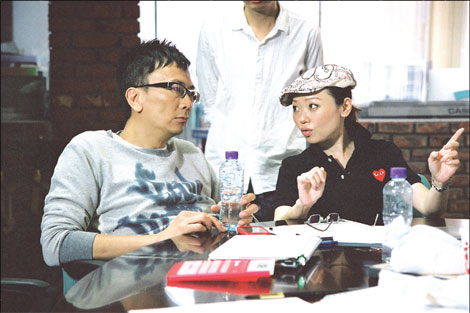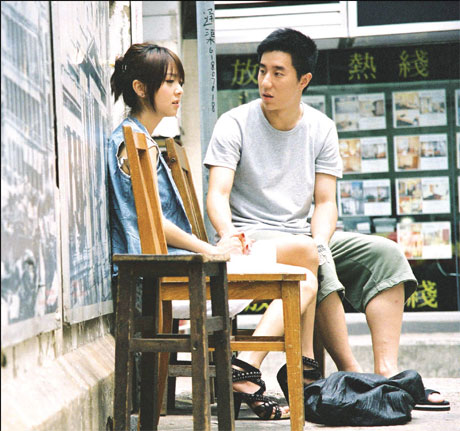Living their fantasies in film
Updated: 2010-06-29 07:23
By Phoebe Cheng(HK Edition)
|
|||||||
|
New generation Hong Kong film director Barbara Wong Chun-chun provides local audiences with atypical topics in her films. Edmond Tang / China Daily |
|
Film producer and writer Lawrence Cheng Tan-shui (left) and Wong are good partners in making films. Provided to China Daily |
It's tough making it in the film industry in Hong Kong but many of the city's younger generation of filmmakers are just happy to be where they are, living out their dreams in a world of celluloid. Phoebe Cheng reports.
New generation Hong Kong film director Barbara Wong Chun-chun and film producer and writer Lawrence Cheng Tan-shui are proud of their new film, even a bit overwhelmed by it. Break Up Club, now screening in the city, is a cosy mockumentary about a love story between Joe, a down-to-earth jobless young man and Flora, a typical Hong Kong girl with a whiny spoiled princess personality.
"Filmmakers, especially those who insist in making movies in Hong Kong, are all fools," Cheng said agitatedly. "We're not producing movies for the sake of Hong Kong's movie industry. We're filming simply because of the affection we have for movies. You'll see Wong screaming 'lights, camera and action', loudly and with focus at the beginning of shooting a scene. This is what she enjoys and finds satisfying. This is already her reward from the movie."
Cheng and Wong know each other well and work together frequently. Break Up Club was their fourth film together.The HK$5.86 million production is financed by the government's Film Development Fund (FDF) scheme (which accounts for about HK$1.76 million of the budget). The remaining production costs were underwritten by Cheng, Wong and their friends.
Despite the limited production budget, the two filmmakers are astonished by the work of their production team. They're especially impressed by the on-screen performances of leading players, Jaycee Chan Cho-ming and Fiona Sit Hoi-kei, starring as Joe and Flora respectively. Regardless of the box office, Wong is simply thrilled that she is able to transform her flights of fancy into film, put them on screen and share them with an audience. To her it's like a mother giving birth to a baby.
"As a filmmaker, and all the filmmakers that I know, we make movies not solely for the sake of money," Wong said. "We keep challenging ourselves. It's very satisfying when we discover new elements and new genres of movies with spanking new topics to share with our audience."
A graduate of the Hong Kong Academy of Performing Arts' drama school, Wong never intended to have a career on center stage. Her goal was to work behind the scenes. She enrolled at New York University's Film School in 1993 and returned to Hong Kong in 1999 after making her first feature-length film, A Carburetor for Suzy.
Wong hopes to provide audiences with more choices, and with atypical topics that veer from the norm of what she sees as big film companies foisting on audiences.
"The bosses of the movies have already chosen for the audience. They may want to produce action movies, kung fu movies, and traditional love stories," she said.
Wong's first production in Hong Kong was a documentary, Women's Private Parts, in which Wong interviewed women and girls of all ages, as young as four, and from all walks of life, probing their inner thoughts about sex and love. After that came Truth or Dare: 6th Floor Rear Flat, Wong's other low-budget movie which surprised local theatre goers in 2003. The movie, based on real people and events, was about the happenings in a flat where a group of young people were drinking and playing "truth or dare".
Wong's productions may come in as low budget, yet they create the same impact as cinema blockbusters. Her movies, which are usually based on stories and experiences of real people, create resonance and manage to touch the hearts of audiences with their inner stories of daily experiences.
"Two things are very important for people working in the creative industry," Cheng said, "observations and friends." Cheng and Wong treat their daily lives and friends as great sources for good stories. Cheng who wrote the script for Break Up Club has never actually experienced a break up of his own.
"It's typically important when you're traveling on MTR or bus," said Wong, who will not give up any chance in which she can grab a story idea that clicks with her. "We have to keep ourselves connected and updated with our friends and society," she said.
It's just what they have done for Break Up Club. Two years ago, they put out a public appeal for real love stories. They received nearly 400 responses and filmed interviews with 100 of their respondents. Some of the footage they shot is included in the movie.
Throughout the film are shaky hand-held scenes wherein lead character Joe documents his daily life with his girlfriend Flora. It is as intimate as a candid camera portrait.
"The cinematographer had to follow the movement of Chan," Wong recalls. "There was no script and every movement is unplanned. When Chan moved left, the cinematographer had to shift left and vice versa. It's not easy."
Wong allows actors to perform naturally without having to follow the script. She endeavors to capture the truth of the characters, adding realism and intimacy to her films. The freedom to create is what drives Cheng as well.
"What we treasure a lot is the freedom to create. This freedom is the most precious. I think it is more extensive than in Hollywood," said Cheng who is proud of the freedom he has to create and try new things when making a film. "We can now 100 percent own the entire idea. But once we co-produce with another company, we are already sharing the idea with others."
Hong Kong directors have to survive in a small market of 7.5 million.It's a situation Cheng describes as "innately handicapped", on top of the lack of resources in terms of budget and talent. Yet he thinks it is the creativity here that is unbeatable and of greatest value.
Although money and market still remain a problem, Wong deals with it, through her positive personality and die-hard spirit. She thinks Hong Kong directors are capable and flexible enough to face the circumstances.
"We can either stick to low-budget productions or co-produce a large-scale movie with a film company on the mainland. That, she believes, will transform the movie industry of Hong Kong. "Hong Kong directors, actually Hong Kong people have the die-hard spirit. We are unbeatable and supple," she said.
|
Jaycee Chan Cho-ming (right) and Fiona Sit Hoi-kei starring as Joe and Flora respectively in Wong and Cheng's latest film Break Up Club. Provided to China Daily |
(HK Edition 06/29/2010 page4)


